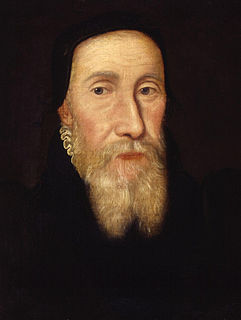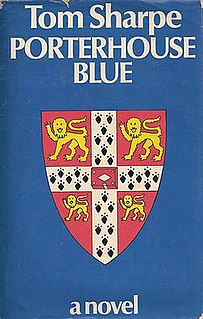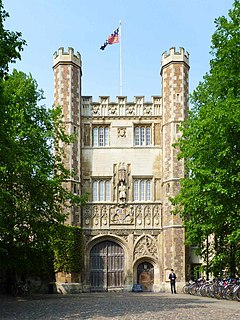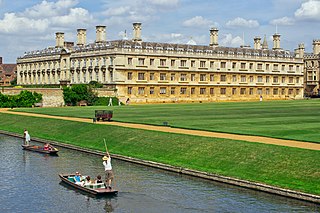
Selwyn College, Cambridge is a constituent college of the University of Cambridge in the United Kingdom. The college was founded in 1882 by the Selwyn Memorial Committee in memory of George Augustus Selwyn (1809–1878), the first Bishop of New Zealand (1841–1868), and subsequently Bishop of Lichfield (1868–1878). It consists of three main courts built of stone and brick along with several secondary buildings, including adjacent townhouses and lodges serving as student hostels on Grange Road, West Road and Sidgwick Avenue. The college has some 60 Fellows and 110 non-academic staff.

Edmund Grindal was a prelate of the Church of England who, during the reign of Elizabeth I, was successively Bishop of London, Archbishop of York, and Archbishop of Canterbury. Though born far from the centres of political and religious power, he had risen rapidly in the church during the reign of Edward VI, culminating in his nomination as Bishop of London; the death of the King prevented his taking up the post, and, along with other Marian exiles, Grindal sought refuge in continental Europe during the reign of Mary I. Upon Elizabeth's accession, Grindal returned and resumed his rise in the church, culminating in his appointment to the highest office.

William Sancroft was the 79th Archbishop of Canterbury, and was one of the Seven Bishops imprisoned in 1688 for seditious libel against King James II, over his opposition to the king's Declaration of Indulgence. Deprived of his office in 1690 for refusing to recognise William and Mary, he later enabled and supported the consecration of new, nonjuring, Bishops leading to the nonjuring schism.

Grantchester is a village and civil parish on the River Cam or Granta in South Cambridgeshire, England. It lies about two miles (3 km) south of Cambridge.

Corpus Christi College, known from the late 14th century through to the 19th century as St Benet's College, is a constituent college of the University of Cambridge. It is notable as the only college founded by Cambridge townspeople: it was established in 1352 by the Guild of Corpus Christi and the Guild of the Blessed Virgin Mary, making it the sixth-oldest college in Cambridge. With around 250 undergraduates and 200 postgraduates, it also has the second smallest student body of the traditional colleges of the University.

Edwin Sandys was an English prelate. He was Anglican Bishop of Worcester (1559–1570), London (1570–1576) and Archbishop of York (1576–1588) during the reign of Elizabeth I of England. He was one of the translators of the Bishops' Bible.

Grantchester Grind is a novel written by Tom Sharpe, a British novelist born in 1928 who was educated at Lancing College and then at Pembroke College, Cambridge.
Sir John Rupert Colville, CB, CVO, known as Jock Colville, was a British civil servant. He is best known for his diaries, which provide an intimate view of number 10 Downing Street during the wartime Premiership of Winston Churchill.

Porterhouse Blue is a novel written by Tom Sharpe, first published in 1974. A satirical look at Cambridge life and the struggle between tradition and reform, Porterhouse Blue tells the story of Skullion, the Head Porter of Porterhouse, a fictional college of Cambridge University.

The Puritan, or the Widow of Watling Street, also known as The Puritan Widow, is an anonymous Jacobean stage comedy, first published in 1607. It is often attributed to Thomas Middleton, but also belongs to the Shakespeare Apocrypha due to its title page attribution to "W.S.".

Thomas Musgrave was Archbishop of York from 1847 to 1860.
Lord Jeremy Pimpole is a fictional character created by author Tom Sharpe, a British novelist. The character of Lord Pimpole is first mentioned in Porterhouse Blue (1974), set in the fictitious Porterhouse College in Cambridge, where his name, with that of a former student, Launcelot Gutterby, is often chanted to himself by Skullion, the Head Porter, as the mantra "Gutterby and Pimpole", when it seems that standards at the College are slipping. This helps to remind Skullion of the days when students had been proper gentlemen.

Skullion is a central character in Porterhouse Blue (1974) and Grantchester Grind (1995), two novels about life in the fictitious Porterhouse College at Cambridge by British novelist Tom Sharpe. For centuries, Porterhouse College has been renowned for its cuisine, the prowess of its rowers and the low level of its academic achievements. Since the College was founded there have been Skullions at Porterhouse.
Roger Goad (1538–1610) was an English academic theologian, Provost of King's College, Cambridge, and three times Vice-Chancellor of the University of Cambridge.

Edmund Keene was an English churchman and academic, who was Master of Peterhouse, Cambridge and later served first as Bishop of Chester, then Bishop of Ely.

Thomas Ridley Sharpe was an English satirical novelist, best known for his Wilt series, as well as Porterhouse Blue and Blott on the Landscape, which were both adapted for television.

Throughout its modern history, the University of Cambridge has featured in cultural works. As of 2020, IMDb list 71 films or TV shows that include Cambridge as a filming location. Below are some notable examples of references to Cambridge in popular culture.

Porterhouse Blue is a 1987 television series adapted by Malcolm Bradbury from the 1974 Tom Sharpe novel of the same name for Channel 4 in four episodes. It starred David Jason as Skullion, Ian Richardson as Sir Godber Evans, Barbara Jefford as his wife Lady Mary, Charles Gray as Sir Cathcart D'Eath, and John Sessions as Zipser. Also appearing were Griff Rhys Jones as Cornelius Carrington, Paula Jacobs as Mrs. Biggs, Bob Goody as Walter, Paul Rogers as the Dean, John Woodnutt as the Senior Tutor, Lockwood West as the Chaplain, Willoughby Goddard as Professor Siblington, Harold Innocent as the Bursar and Ian Wallace as the Praelector.

Benjamin Pulleyne, sometimes speltPullan, was a mathematician, Church of England clergyman, fellow of Clare College, Cambridge, and headmaster of Gresham's School, then usually known as Holt Grammar School.
















